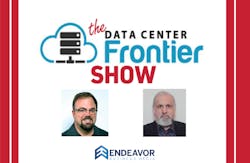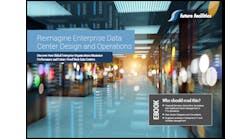The latest episode of the Data Center Frontier Show podcast begins with the site's daily editors, Matt Vincent and David Chernicoff, commemorating the "hand off" of show hosting duties from DCF founder and Editor at Large, Rich Miller. As duly noted, this transition of course occurs amidst another terrifying, annually recurring "hottest year on record" for planet Earth.
The unfolding discussion between editors focuses on two areas wherein David has done significant reporting this year, based on his wealth of accumulated industry knowledge: data center cooling and the future of power for data centers. Tune in to hear the editors unsuccessfully attempt to bypass the topic of A.I. for even just three minutes...
Here’s a timeline of points Matt and David discuss on the podcast:
- 0:00 - Podcast Hand-Off Notes: 'Oh Captain, My Captain'
- 1:17 - Hello to David Chernicoff in the Hottest Year on Record (Again)
- 2:03 - Cooling and the Future of Power (and the Impact of AI)
- 2:55 - "Whatever space you give it, it will fill."
- 3:08 - Doing the math for a tray of NVIDIA H100 processors.
- 4:02 - 10 kW isn't high-density anymore (and DoE's COOLERCHIPS program knows it).
- 5:02 - Becoming better corporate citizens of the world (or at least Northern Va.)
- 6:40 - Notes on CO2 Cooling and Liquid Cooling
- 7:21 - Replacing HFCs for Less GHGs
- 9:26 - Liquid Cooling: A Whole Different Ball of Wax
- 10:44 - Devil's Advocate: Water-based Cooling
- 13:14 - Incremental Cooling Processes and the Real World
- 14:17 - "Musk bought 10,000 H100 CPUs..."
- 15:04 - Cooling in the Hybrid Cloud Environment
- 16:02 - Data Centers, the Utility Crunch and Nuclear Power
- 18:01 - The Main Issue is the Grid Itself
- 19:21 - The Building of New Substations Has to Occur
- 20:31 - "Is AI the straw that breaks the camel's back?"
- 23:02 - Implications for Edge Data Centers
- 24:53 - The Next Hurdle for AI: The Speed of Interconnection
Listen to today's show:
Here are links to some recent DCF stories on data center cooling and the future of data center power:
- Waiting to Exhale: CO2 Cooling in the Data Center
- Liquid Cooling in the Spotlight
- Rethinking Data Center Power Will be Key to Sustainability
- The Power Problem: Transmission Issues Slow Data Center Growth
Did you like this episode? Be sure to subscribe to the Data Center Frontier show at Podbean to receive future episodes on your app.

Matt Vincent
A B2B technology journalist and editor with more than two decades of experience, Matt Vincent is Editor in Chief of Data Center Frontier.





